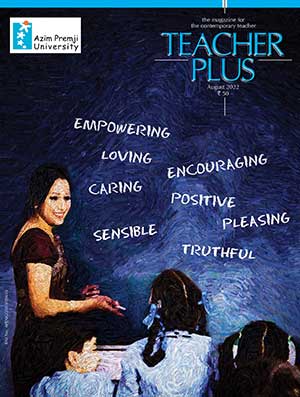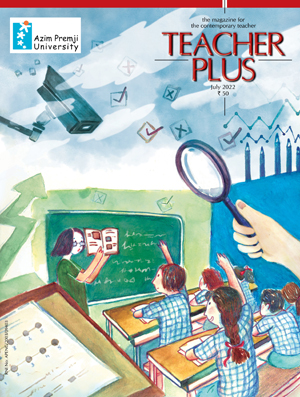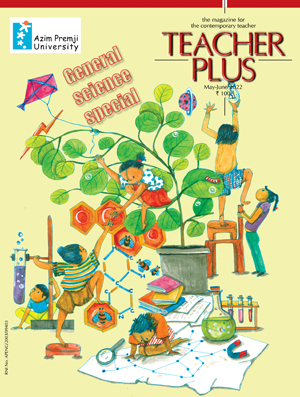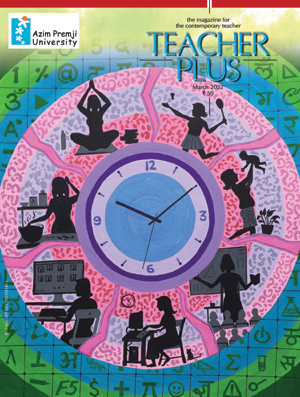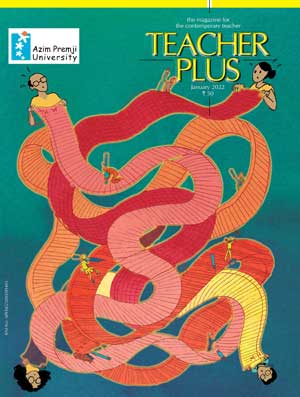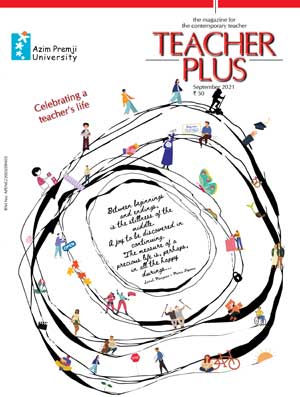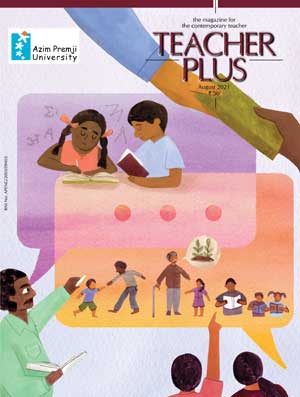Current issue
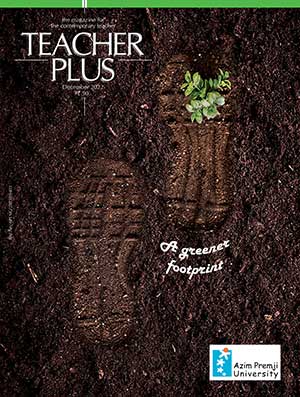
In this issue
Information and inspiration
Usha Raman
Climate change is not a fad; it is a reality that is staring us in our faces. We talk about it, attend seminars on it, take out marches to protest against it, and then we go back to our high consuming lifestyles. As the biggest threat to human survival, climate change is something that we have to respond to, both as a society and as individuals, consistently and regularly like a ritual.
What is climate change governance?
Neha and R R Rashmi
The Earth’s temperature has risen by 1.1°C since pre-industrial times. While this rise may appear miniscule, the world is already feeling its effects. A solution to this problem requires cooperation and coordination between a variety of players both at the global and national level. How has the world responded to the climate challenge and what direction can we take moving into the future?
How far has your food travelled?
Seema Agarwal
We no longer need visiting relatives to bring us Washington apples or Californian almonds. Living in India, we can consume dates from Saudi Arabia and kiwis from New Zealand. We get canned pineapples and frozen peas throughout the year. But is this really progress? With our mindless consumption and growing needs, we are only burning a hole in the Earth’s atmosphere, making it less inhabitable.
Nurturing instead of building?
Geetha Iyer
Climate change is very obvious to anyone that is willing to observe. We also know that unless we are willing to change the way we live, we are only heading towards annihilation. Changing human behaviour is easier at a young age and that is why we must introduce climate change in the classroom. A few suggestions on how teachers can introduce the topic to students.
November 2022
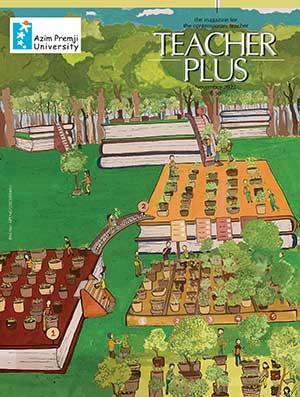
Cover Story | November 2022
ASER – Shifting the narrative from schooling to learning
Vignesh Krishnan, Ngawang Lhakey and Isha Thakur
The Annual State of Education Report (ASER) is a nationwide household survey conducted to assess the reading and arithmetic levels of children from over 15000 villages across the country. Started and led by Pratham, a non-governmental organisation over two decades ago, it is one of the most significant initiatives ever carried out to asse
November 2022 | Off The Library Shelves
Literature in the language classroom
Sreya Rakshit
A literary text can open up whole new vistas for children in a language classroom because it gives them a chance to engage with ideas of inequality, emotions, gender, justice, integrity or even friendship without any sense of discomfort. In this article, the author explains how one such literary text, Dear Mrs. Naidu, helped her students reflect on various dense s
Interventions | November 2022
Rebirth of reading
Suhail Abdul Hameed
Libraries usually serve as a memorable space for avid book lovers who love to just browse and perhaps even read the books that they choose. Everyone has their own experience of engaging with libraries as a space. This article throws light on efforts to create such a space for students in a government primary school in Chhattisgarh.
 Read more articles from this issue
Read more articles from this issue
October 2022
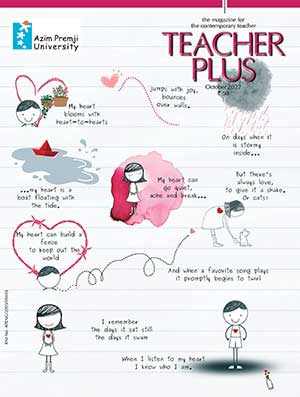
Nature Watch | October 2022.
Habitats: Forest canopies
Geetha Iyer
The canopy is the least explored but most important structure of a forest. With tree heights, especially in tropical forests, averaging a 100 feet, canopies are difficult for human beings to reach, which is why they are not as well explored. Canopies are also the parts that host a rich biodiversity. A knowledge of the canopies is important in the sustainable management of fo
October 2022 | Things To Think About.
Lend me your ears
Riya Dominic
To be able to contribute to meaningful dialogue, what we need is not just knowledge of the topic in question but also the ability to listen to the other person and keep an open mind. Can schools and colleges create an atmosphere that fosters these skills in young people?
Cover Story | October 2022.
The Everything School
Sheela Ramakrishnan
Once upon a time, it was the role of the home to nurture social and emotional skills in children. Today schools are offering curriculums to teach these skills. Are societies and homes no longer places to imbibe these qualities? Won’t adding these curriculums increase the school’s workload? We take a closer look at SEL, why we need it and how teachers can incorpor
 Read more articles from this issue
Read more articles from this issue
September 2022
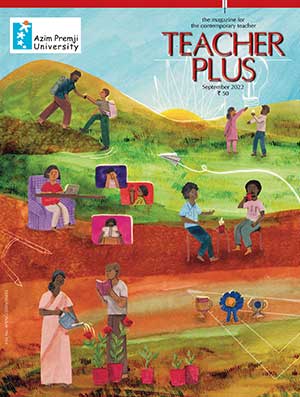
September 2022.
Can a teacher be a friend? A student wonders
Aishwarya R
In a teacher-student relationship, do the power dynamics change? How far can a teacher get friendly with a student? In this day and age, a teacher’s role is more like a compass where she guides a student, not just in academics but in life too. Teacher stories beyond subjects are worth celebrating, their struggles are inspirational and their sensitivity towards students can
September 2022.
Professional kinship
B. Ajitha
Friendship has no boundaries whether at the academic level or non- academic level. If you are on a journey towards becoming a better teacher, look no further than your colleague in the staffroom. The collaborative nature of teaching can provide the right impetus and framework to look objectively at teaching practices, join hands with your peers for feedback and design interven
Cover Story | September 2022.
Two teacher friends and a visionary principal
Sheela Ramakrishnan
Can working professionals ever be friends in the true sense of the word? Most would agree that this could be next to impossible. However, the education space begs to be different. In a school, when colleagues become friends, the relationship moves to a new level, bringing with it a sense of satisfaction and achievement that would not have been possible otherwise. Our
 Read more articles from this issue
Read more articles from this issue
Information and inspiration
Usha Raman
Climate change is not a fad; it is a reality that is staring us in our faces. We talk about it, attend seminars on it, take out marches to protest against it, and then we go back to our high consuming lifestyles. As the biggest threat to human survival, climate change is something that we have to respond to, both as a society and as individuals, consistently and regularly like a ritual.
What is climate change governance?
Neha and R R Rashmi
The Earth’s temperature has risen by 1.1°C since pre-industrial times. While this rise may appear miniscule, the world is already feeling its effects. A solution to this problem requires cooperation and coordination between a variety of players both at the global and national level. How has the world responded to the climate challenge and what direction can we take moving into the future?
How far has your food travelled?
Seema Agarwal
We no longer need visiting relatives to bring us Washington apples or Californian almonds. Living in India, we can consume dates from Saudi Arabia and kiwis from New Zealand. We get canned pineapples and frozen peas throughout the year. But is this really progress? With our mindless consumption and growing needs, we are only burning a hole in the Earth’s atmosphere, making it less inhabitable.
Nurturing instead of building?
Geetha Iyer
Climate change is very obvious to anyone that is willing to observe. We also know that unless we are willing to change the way we live, we are only heading towards annihilation. Changing human behaviour is easier at a young age and that is why we must introduce climate change in the classroom. A few suggestions on how teachers can introduce the topic to students.
November 2022

Cover Story | November 2022
ASER – Shifting the narrative from schooling to learning
Vignesh Krishnan, Ngawang Lhakey and Isha Thakur
The Annual State of Education Report (ASER) is a nationwide household survey conducted to assess the reading and arithmetic levels of children from over 15000 villages across the country. Started and led by Pratham, a non-governmental organisation over two decades ago, it is one of the most significant initiatives ever carried out to asse
November 2022 | Off The Library Shelves
Literature in the language classroom
Sreya Rakshit
A literary text can open up whole new vistas for children in a language classroom because it gives them a chance to engage with ideas of inequality, emotions, gender, justice, integrity or even friendship without any sense of discomfort. In this article, the author explains how one such literary text, Dear Mrs. Naidu, helped her students reflect on various dense s
Interventions | November 2022
Rebirth of reading
Suhail Abdul Hameed
Libraries usually serve as a memorable space for avid book lovers who love to just browse and perhaps even read the books that they choose. Everyone has their own experience of engaging with libraries as a space. This article throws light on efforts to create such a space for students in a government primary school in Chhattisgarh.
October 2022

Nature Watch | October 2022.
Habitats: Forest canopies
Geetha Iyer
The canopy is the least explored but most important structure of a forest. With tree heights, especially in tropical forests, averaging a 100 feet, canopies are difficult for human beings to reach, which is why they are not as well explored. Canopies are also the parts that host a rich biodiversity. A knowledge of the canopies is important in the sustainable management of fo
October 2022 | Things To Think About.
Lend me your ears
Riya Dominic
To be able to contribute to meaningful dialogue, what we need is not just knowledge of the topic in question but also the ability to listen to the other person and keep an open mind. Can schools and colleges create an atmosphere that fosters these skills in young people?
Cover Story | October 2022.
The Everything School
Sheela Ramakrishnan
Once upon a time, it was the role of the home to nurture social and emotional skills in children. Today schools are offering curriculums to teach these skills. Are societies and homes no longer places to imbibe these qualities? Won’t adding these curriculums increase the school’s workload? We take a closer look at SEL, why we need it and how teachers can incorpor
September 2022

September 2022.
Can a teacher be a friend? A student wonders
Aishwarya R
In a teacher-student relationship, do the power dynamics change? How far can a teacher get friendly with a student? In this day and age, a teacher’s role is more like a compass where she guides a student, not just in academics but in life too. Teacher stories beyond subjects are worth celebrating, their struggles are inspirational and their sensitivity towards students can
September 2022.
Professional kinship
B. Ajitha
Friendship has no boundaries whether at the academic level or non- academic level. If you are on a journey towards becoming a better teacher, look no further than your colleague in the staffroom. The collaborative nature of teaching can provide the right impetus and framework to look objectively at teaching practices, join hands with your peers for feedback and design interven
Cover Story | September 2022.
Two teacher friends and a visionary principal
Sheela Ramakrishnan
Can working professionals ever be friends in the true sense of the word? Most would agree that this could be next to impossible. However, the education space begs to be different. In a school, when colleagues become friends, the relationship moves to a new level, bringing with it a sense of satisfaction and achievement that would not have been possible otherwise. Our

